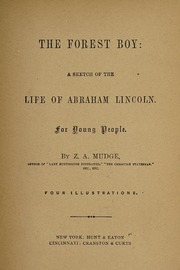Abraham Lincoln, Biographically
Listen to the Recess! Clip
| Author | Rita Smith |
| Air Date | 2/11/2005 |

Abraham Lincoln, Biographically Transcript
The first full biography of Abraham Lincoln written specifically for young people is a highly laudatory book entitled The Forest Boy: A Sketch of the Life of Abraham Lincoln, for Young People by Z. A. Mudge published in 1867.
Mudge’s objective was that Lincoln’s life serve as a model for the young: “We have studied to bring out” he writes in the Preface, “for an example and inspiration to the young, that moral integrity and true goodness which were so prominent in Mr. Lincoln’s character.” 1 To accomplish this he relates stories and anecdotes about Lincoln which illustrate desirable traits and then makes pointed observations naming the quality Lincoln displayed. As an illustration of Lincoln’s humility, Mudge tells a story about gloves. After Lincoln became President he scheduled a ride in the Presidential carriage with an old friend from Illinois. Neither man had worn gloves in the days of their former acquaintance, except when it was cold, but it was now the custom in elite Washington society to wear gloves in social situations. Both men, aware of society’s dictate, considered beforehand whether to wear gloves or not. Lincoln decided to put his in his pocket and don them only if his friend had his on; his friend decided to wear his, but to remove them if the President wasn’t wearing his. When they were seated in the carriage Mr. Lincoln, seeing that his friend wore gloves, slyly began to draw his on, and his friend, seeing that the President wasn’t wearing gloves, was as surreptitiously removing his. “Discerning the state of affairs,” Mudge writes, “they both burst into a hearty laugh…and were soon talking earnestly together ungloved, and on the old familiar footing…. A good-sized volume” Mudge continues, “might be made of such illustrations of Mr. Lincoln’s freedom from the pride of station…. [even] while in the exercise of an official power which shaped the destinies of millions of the human race”2
In the final chapter, Mudge reminds his young reader that “The story of our beloved Lincoln carries with it its own instructive lesson, and enforces it too. From the log-cabin to the White House, it is a story of truthfulness, temperance, love, unselfish labor, and large hearted benevolence,”3 and he ends his book with an excerpt from Bishop Matthew Simpson’s eulogy at Lincoln’s burial in Springfield, Illinois. “Chieftain, farewell! The nation mourns thee….The youth of our land shall emulate thy virtues….We crown thee as our martyr, and humanity enthrones thee as her triumphant son”4
Notes
1 Mudge, p. [5].
2 Ibid., p. 241
3 Ibid, p. 319
4 Ibid, p. 319
Source
Mudge, Z. A., The Forest Boy: A Sketch of the Life of Abraham Lincoln for Young People. New York: Carlton & Lanahan, Cincinnati: Hitchcock & Walden, c1867.